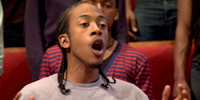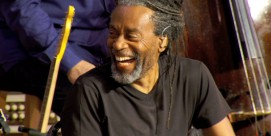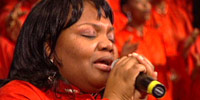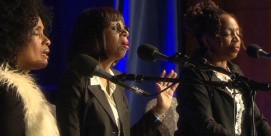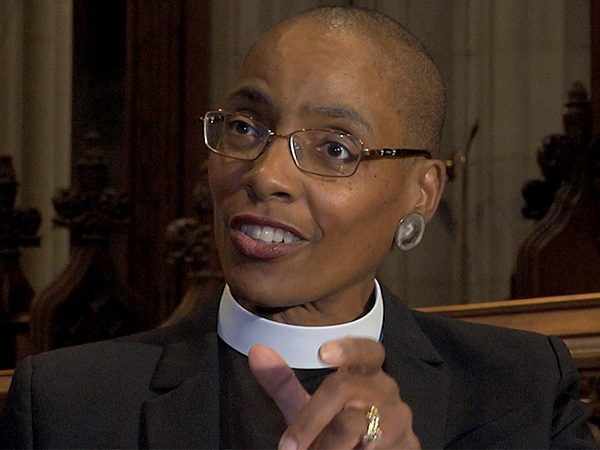 REV. KELLY BROWN DOUGLAS, (Professor of Religion, Goucher College, and Canon Theologian, Washington National Cathedral): This is a very special evening of music, the music of the African diaspora, testifying to the struggles and strivings of African peoples.
REV. KELLY BROWN DOUGLAS, (Professor of Religion, Goucher College, and Canon Theologian, Washington National Cathedral): This is a very special evening of music, the music of the African diaspora, testifying to the struggles and strivings of African peoples.
Spirituals are, of course, the songs that the enslaved crafted to tell the story of their experience, but more than that to tell the story of their faith, and the understanding of who they were in relationship to God and who God was in relationship to them, and it became a story of freedom.
We oftentimes, when we tell the story of slavery, we talk about the way a people were acted upon, but we don’t often tell the story of slavery from their own perspective. They resisted, and they acted back, and the fact of the spirituals is a testament to the way in which they acted back and to the way in which they crafted their own culture.
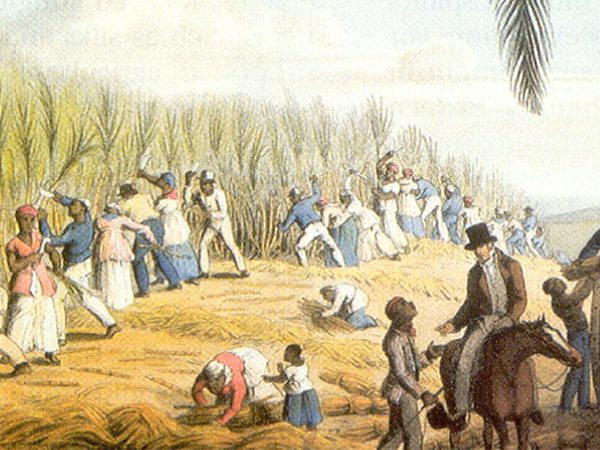 When we talk about their testimony of faith is that, indeed, they were testifying to a God that they knew in freedom and a God that knew them in freedom. I often like to say even now the enslavers introduced them to Christianity, they did not introduce them to God. The enslaved Africans knew God before their enslaving kidnappers kidnapped them.
When we talk about their testimony of faith is that, indeed, they were testifying to a God that they knew in freedom and a God that knew them in freedom. I often like to say even now the enslavers introduced them to Christianity, they did not introduce them to God. The enslaved Africans knew God before their enslaving kidnappers kidnapped them.
They're also songs that function on a more practical level, because within those songs are coded messages, and so they are able to talk to one another in an honest way about their hopes, their dreams, to relay other kinds of messages that they can say in open, yet hidden from view of their enslavers. So, for instance, “Go down, Moses, way down in Egypt’s land, tell old pharaoh to let my people go.” They may be talking about when they’re getting ready to escape the underground railroad. Or even speaking about some of the slave rebellions that we know about.
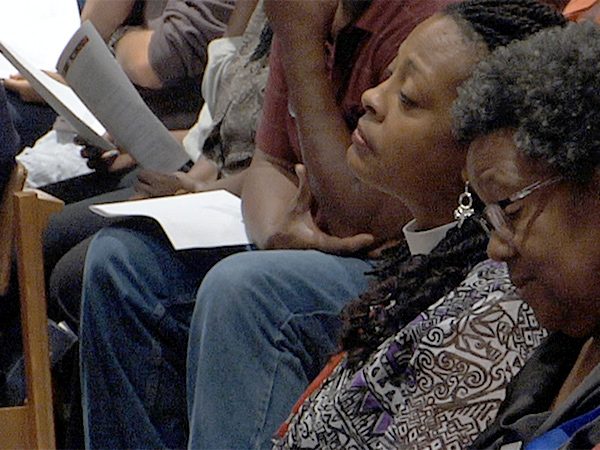 They talk about God’s going to trouble the water, wading in the water. Immediately images of crossing over into freedom, crossing over into free land. And so we know that yeah, perhaps they’re even really talking about and giving someone a message and a signal: it’s time to go wading in the water, it’s time to get out of here, it’s time to become free. Going under and rising up again to a new life.
They talk about God’s going to trouble the water, wading in the water. Immediately images of crossing over into freedom, crossing over into free land. And so we know that yeah, perhaps they’re even really talking about and giving someone a message and a signal: it’s time to go wading in the water, it’s time to get out of here, it’s time to become free. Going under and rising up again to a new life.
African Americans must continue to struggle for their rights as human beings in this country and in this context. As long as we still live out of a legacy of slavery then the spirituals will continue to have resonance.

 REV. KELLY BROWN DOUGLAS, (Professor of Religion, Goucher College, and Canon Theologian, Washington National Cathedral): This is a very special
REV. KELLY BROWN DOUGLAS, (Professor of Religion, Goucher College, and Canon Theologian, Washington National Cathedral): This is a very special  When we talk about their testimony of faith is that, indeed, they were testifying to a God that they knew in freedom and a God that knew them in freedom. I often like to say even now the enslavers introduced them to Christianity, they did not introduce them to God. The enslaved Africans knew God before their enslaving kidnappers kidnapped them.
When we talk about their testimony of faith is that, indeed, they were testifying to a God that they knew in freedom and a God that knew them in freedom. I often like to say even now the enslavers introduced them to Christianity, they did not introduce them to God. The enslaved Africans knew God before their enslaving kidnappers kidnapped them. They talk about God’s going to trouble the water, wading in the water. Immediately images of crossing over into freedom, crossing over into free land. And so we know that yeah, perhaps they’re even really talking about and giving someone a message and a signal: it’s time to go wading in the water, it’s time to get out of here, it’s time to become free. Going under and rising up again to a new life.
They talk about God’s going to trouble the water, wading in the water. Immediately images of crossing over into freedom, crossing over into free land. And so we know that yeah, perhaps they’re even really talking about and giving someone a message and a signal: it’s time to go wading in the water, it’s time to get out of here, it’s time to become free. Going under and rising up again to a new life.
